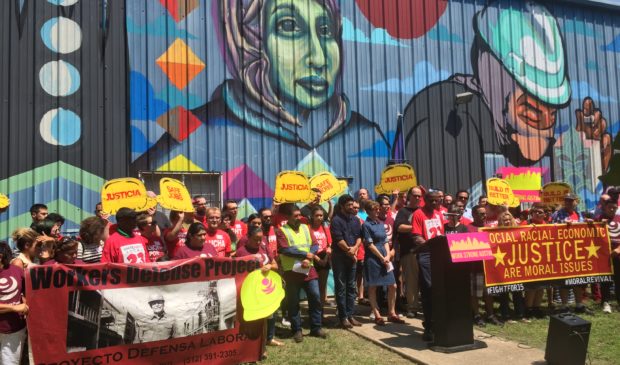Council approves paid sick leave ordinance
Friday, February 16, 2018 by
Jack Craver Shortly after midnight on Friday, Austin became the first city in the South to require employers to provide workers with paid sick leave.
The ordinance, authored largely by City Council Member Greg Casar, will require businesses and nonprofits to provide employees with one hour of paid sick leave for every 30 hours worked.
Workers at employers with more than five employees will be able to accrue up to eight days of paid sick leave, while those at smaller employers will accrue up to six. The smaller employers will also not be subject to the new rules until October 2020, as opposed to October 2018 for the rest.
The ordinance passed 9-2, with only Council members Ellen Troxclair and Ora Houston in dissent.
The ordinance was the culmination of a campaign launched by Casar and labor rights groups in September that sought to mobilize workers in support of the policy and gain backing from health organizations, nonprofits and local businesses.
The Austin Chamber of Commerce, the Austin Independent Business Alliance and the National Federation of Independent Business vehemently opposed the proposal.
As public testimony began around 7 p.m. Thursday, the Council chamber was at capacity; a long line of people waited in the City Hall lobby to address their elected officials. A total of 272 people signed up to speak, and 148 others showed up to register their support or opposition.
Supporters represented a broad cross-section of the community, many of whom told stories about their experiences of working while ill.
The great majority of speakers were in favor of the ordinance. However, dozens of business owners spoke against the proposal, saying that the ordinance was rushed and that mandating paid sick leave would cost businesses and end up hurting more workers than it would help.
“I’m really kind of appalled by the process,” said Rebecca Melançon, the head of the Austin Independent Business Alliance, which represents small businesses.
After more than four hours of public testimony, Council began debate on the measure.
Troxclair began her remarks by upbraiding the ordinance’s supporters in the audience for being “so incredibly disrespectful” to business owners who had spoken against it. She said she understood why people want better benefits; however, she warned that the proposed ordinance could put people out of work entirely.
“Jobs don’t grow on trees,” she said.
Despite acknowledging the action to be “pointless,” Troxclair offered an amendment to exempt employers with fewer than 15 employees from the ordinance. It failed 3-7, with only Houston and Council Member Leslie Pool in support and Council Member Alison Alter abstaining.
Alter, who had raised concerns about the effect of the ordinance on nonprofit organizations, offered an amendment to delay implementation by a year for such groups. That amendment also failed, with only Troxclair, Pool and Houston joining Alter in support. In describing the challenges that nonprofits face, Alter noted that the “obscene” tax package signed by President Donald Trump has reduced the incentive to make tax-deductible contributions.
Houston acknowledged before her remarks that she would not be getting “hand claps and woo-hoos” from the audience for her position. She reiterated her concerns about the “unintended consequences” the ordinance might have for small businesses, highlighting local, minority-owned businesses in her district, such as Country Boyz Fixins and Sam’s BBQ, both restaurants on East 12th Street.
Both Alter and Pool said they would support the ordinance but expressed concerns about the potential impact on small businesses and the process by which the ordinance was crafted.
“We may not have had sufficient time to work out the details,” said Alter.
Most Council members voiced excitement and pride to approve the measure.
“I can’t wait for the rest of the big cities in Texas to follow our lead,” said Council Member Delia Garza.
Council Member Pio Renteria described growing up in East Austin in a home with an outhouse, in a community where people were paid low wages and “didn’t have any respect” from the ruling class. His civic involvement, he said, has been oriented toward countering that injustice, and the paid sick leave vote was another step toward undoing it.
“It’s long overdue,” he said.
Council Member Jimmy Flannigan, who had sparred with Casar on Tuesday after Flannigan was accused by some paid-sick-leave supporters of offering amendments linked to the Koch brothers, appeared to bury the hatchet on the dais, thanking Casar and others for addressing some of his concerns and coming to a compromise on the issue.
Mayor Steve Adler returned to his oft-employed description of Austin as a “magical place” that owes its magic to its people. He said that he was proud to be part of a Council that is trying to address the economic forces that are driving people out of town, whether those forces be rising housing costs or low wages.
In his closing remarks, Casar thanked all of those in attendance for their activism and promised that their efforts would be felt beyond the city limits.
“Without your organizing, this would not have come to pass, and without your organizing, we will not be able to spread this across this state and country,” he said.
The Austin Monitor’s work is made possible by donations from the community. Though our reporting covers donors from time to time, we are careful to keep business and editorial efforts separate while maintaining transparency. A complete list of donors is available here, and our code of ethics is explained here.
You're a community leader
And we’re honored you look to us for serious, in-depth news. You know a strong community needs local and dedicated watchdog reporting. We’re here for you and that won’t change. Now will you take the powerful next step and support our nonprofit news organization?






